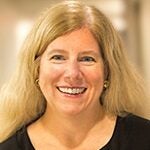
Jennifer Wayman, MHS, President & CEO
Hager Sharp
Tell me a little bit about your background and your current role at Hager Sharp.
I have spent my career in agencies, first Ogilvy and now Hager Sharp, working in social marketing and health communications. I currently serve as President and CEO of Hager Sharp, where our mission is to work with clients seeking to make the world a better place and help people live healthier, smarter, safer lives.
Can you explain what social marketing is and how your agency incorporates this practice into the work you do, the clients you choose to take on, and your company culture?
Social marketing is a 50-year-old discipline that combines ideas from commercial marketing and the social sciences to develop activities aimed at changing or maintaining peoples’ behavior for the benefit of individuals and society as a whole. This ideal of working in the public interest permeates Hager Sharp’s culture in many ways, from influencing our decision to pursue new clients to fueling our team’s volunteer and community service projects on company time. As an employee-owned agency, we use our autonomy to prioritize seeking clients and projects that align with our team members’ interests, passions, and values.
Is there a particular campaign or issue that you are most proud of?
I can’t pick just one. I’ve had the privilege of working on many meaningful and successful projects, including campaigns to promote women’s heart health, colorectal cancer screening, skin cancer prevention, pediatric palliative care, vaccines, and more. I’m especially proud of Hager Sharp’s work on CDC’s HPV Vaccine Is Cancer Prevention campaign, which engaged healthcare providers and parents in increasing HPV vaccinations among adolescents. I’m also enormously proud of Hager Sharp’s work for the Department of Education’s National Assessment of Educational Progress, also known as the Nation’s Report Card, which is the largest nationally representative and continuing assessment of what America’s students know and can do in various subject areas and helps inform decisions about how to improve the education system in the U.S.
As a previous WWPR Woman of the Year, what advice would you give to other women who are looking to step up in the PR industry?
I’d say be true to yourself and your interests, and don’t be afraid to explore “lateral” as well as “upward” opportunities throughout your career. There are a lot of different paths in PR – from specializing in a specific skill set to mastering client service to leading operations – and if you follow your heart it will make your journey much more meaningful and rewarding.
What has being a member of WWPR meant to you?
When I started in this industry, there were far fewer women than there are now, so WWPR provided important opportunities for networking and support. Over the years, I’ve really enjoyed the camaraderie and “women helping women” aspects of WWPR.



